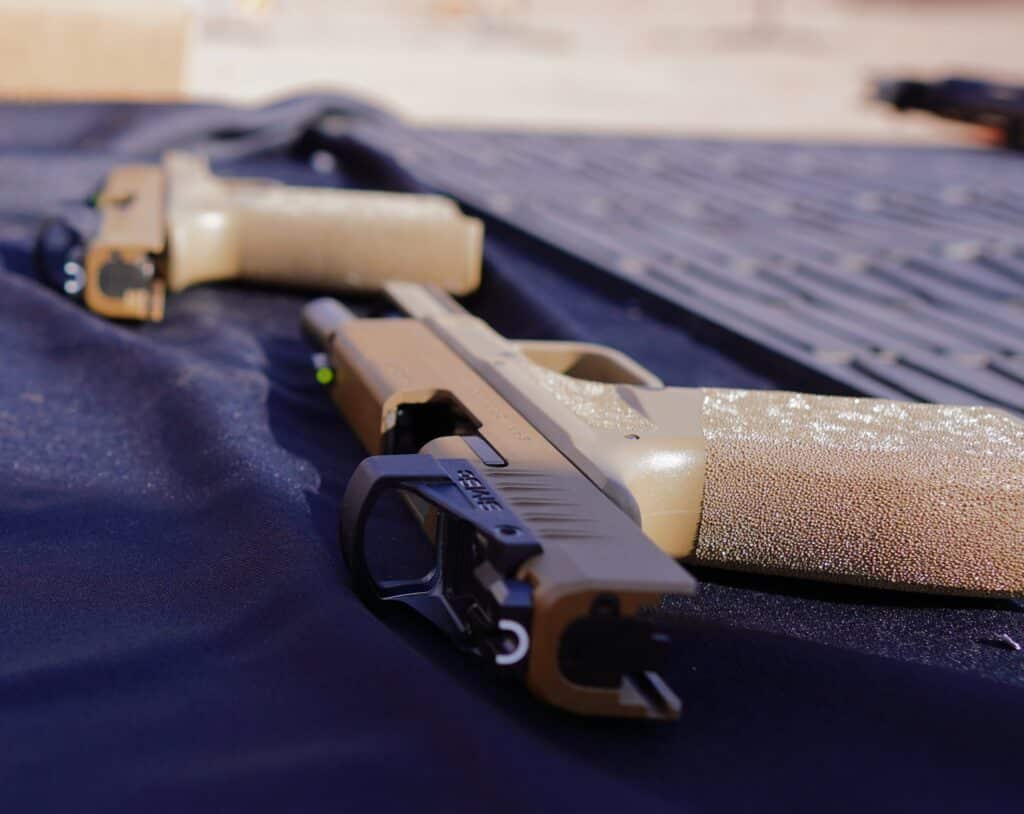This week, we saw a ruling that bucked the recent trend of federal courts upholding the gun rights of 18-to-20-year-olds. A three-judge panel of the Eleventh Circuit upheld Florida’s ban on firearms sales to anyone under 21. But I explain why that law probably isn’t long for this world regardless.
On the flip side of the coin, Contributing Writer Jake Fogleman looks at why the most aggressive “Second Amendment Sanctuary” laws don’t survive scrutiny either. When “sanctuary” declarations turn into nullification exercises, federal courts are unlikely to be sympathetic. And they certainly haven’t been so far.
Plus, Ashley Hlebinsky joins the podcast to talk about the new firearms research center at the University of Wyoming.

Analysis: Florida’s Under 21 Gun Ban Unlikely to Last Much Longer [Member Exclusive]
By Stephen Gutowski
Florida’s law barring gun sales to anyone who isn’t 21 years old won a victory in federal court this week, but it probably won’t last.
On Thursday, a three-judge panel for the Eleventh Circuit unanimously ruled in favor of the ban. The judges found the law is in line with the historical tradition of firearms regulation under the Second Amendment. They ruled that late-19th-century laws against the same age group buying or carrying pistols were close enough analogs for Florida’s law.
“Because Florida’s Act is at least as modest as the firearm prohibitions on 18-to-20-year-olds in the Reconstruction Era and enacted for the same reason as those laws, it is ‘relevantly similar’ to those Reconstruction Era laws,” Judge Robin Rosenbaum, an Obama appointee, wrote for the majority. “And as a result, it does not violate the Second Amendment.”
The opinion is among the more serious attempts to justify a modern gun ban under the Bruen standard, but there are several reasons to think the Florida law won’t be around for long.
The first, and most pressing, is that the legislature is looking to repeal the ban. That’s one reason Judge Charles Wilson, who ultimately ruled in favor of the law, argued the court should have waited to see what the legislature would do instead of issuing a ruling.
“I would wait to issue an opinion until the current session of the Florida legislature completes its consideration of H.B. 1543, which may render the issue moot,” he wrote in a concurrence. “If passed, H.B. 1543 would reduce the minimum age in the law at issue from 21 to 18.”
In fact, when the office of Florida Attorney General Ashley Moody (R.) explained that she is obligated to defend the law in a comment to The Reload, the spokesperson made sure to note the legislature is working to repeal it. Republicans control both parts of the statehouse with a supermajority and Governor Ron Desantis (R.) has taken an aggressively pro-gun stance this session. So, the repeal appears to have a good chance of passing.
But, even if repeal fails, a higher court may well still strike down the law. The three-judge panel the case drew at this stage was probably the least favorable plaintiffs could have hoped for. They got a panel with two Democratic appointees from a court that has seven Republican appointees and just four Democratic ones.
There is a good chance the case will go to a full Eleventh Circuit panel before all is said and done. In fact, one judge on the circuit has already requested just that. The case seems to be going in the same direction the Cargill v. Garland bump stock ban case went in the Fifth Circuit. That saw a three-judge panel of Democratic appointees uphold the ban only to have the en banc panel toss it a short time later.
And there are some clear weak points in the Florida case. The biggest one is its complete reliance on laws passed not during the founding era, but the reconstruction era.
“[I]t’s clear that the public understanding of the Second Amendment at the time of the Fourteenth Amendment’s ratification—as demonstrated by the wealth of Fourteenth Amendment Ratification Era analogues for Florida’s law—permitted the states to limit the sale of firearms to those 21 and older,” she wrote.
While the Supreme Court has used 19th-century laws as part of its historical analysis, it has made clear that the founding era is paramount.
“A final word on historical method: Strictly speaking, New York is bound to respect the right to keep and bear arms because of the Fourteenth Amendment, not the Second,” Justice Thomas wrote for the majority. “Nonetheless, we have made clear that individual rights enumerated in the Bill of Rights and made applicable against the States through the Fourteenth Amendment have the same scope as against the Federal Government. And we have generally assumed that the scope of the protection applicable to the Federal Government and States is pegged to the public understanding of the right when the Bill of Rights was adopted in 1791.”
And, even though Judge Rosenbaum dismisses the fact that 18-to-20-year-olds were considered part of the militia at the founding and could even be required to provide their own firearms when mustering, there’s a good chance the other Eleventh Circuit judges will place more importance on the founding-era history. Additionally, the other judges may question just how close of a fit the late-19th-century laws are for the Florida ban. Unlike the modern prohibition, which bans all gun sales to 18-to-20-year-olds, the laws cited in the ruling only ban the sale of pistols to those under 21. Several explicitly make exceptions for shotgun and rifle sales and one only applies to carrying pistols.
So, Florida’s ban on selling guns to those under 21 survives for now. But probably not for long.
Podcast: Ashley Hlebinsky on the University of Wyoming’s New Firearms Research Center [Member Early Access]
By Stephen Gutowski
On this week’s episode, we’re exploring a new effort to make firearms law and history a specific academic pursuit.
Ashley Hlebinsky joins the show to tell us about the University of Wyoming’s Firearms Research Center. She is the former curator of the Cody Firearms Museum who helped found the new center. She explains what she and a top law professor at the school hope to accomplish with the effort.
Hlebinsky said the goal is to develop gun research as a unified topic of study. She said the center is hoping to bring scholars from around higher education to work together at events and on different projects. That includes working with other institutions, including Duke University’s Center for Firearms Law.
However, she said the UW center also plans to work with people, like herself, who don’t have advanced degrees but have tremendous experience working with historic firearms. Hlebinsky argued museum curators, researchers, and show hosts have often amassed as much or more knowledge, often from working directly with primary sources, than those with graduate degrees. She wants to identify the best way to harness that knowledge while avoiding the common pitfalls of amateur historical work.
She also addressed critics who have questioned the center accepting funding from some gun company executives. Hlebinsky said the funding wouldn’t dictate what conclusions the center’s work comes to. She said she had fought to keep the center’s work independent, even threatening to resign when some lawmakers sought to control what the center could do.
Hlebinsky also shared some of her favorite guns from her time as the curator at Cody Firearms Museum. She pointed to several guns that developed features years or even decades before they received mainstream adoption. And she talked about how video games and movies impacted attendance at the museum in interesting and unexpected ways.
Plus, Contributing Writer Jake Fogleman and I talk about why the major credit card companies have backed away from a plan to add a merchant code for gun stores.
You can listen to the show on your favorite podcasting app or by clicking here. Video of the episode is available on our YouTube channel. Reload Members get access on Sunday. As always, everyone else can listen on Monday.
Come on the Podcast
One of the many perks of a Reload membership is the opportunity to appear on the podcast. We’ve had a lot of people on the show from all kinds of backgrounds. It’s one of my favorite segments since it gives us all a better insight into the community that makes this publication possible. If you want to come on the show, just reply to this email and let me know!

Analysis: The Lines are Starting to Be Drawn Around ‘Second Amendment Sanctuary’ Laws [Member Exclusive]
By Jake Fogleman
States and localities that refuse to use local resources to enforce certain gun-control measures may have a plausible legal path. But courts are starting to block efforts that move beyond that.
On Tuesday, U.S. District Judge Brian C. Wimes, an Obama appointee, ruled that Missouri’s “Second Amendment Preservation Act” (SAPA) is unconstitutional.
“SAPA’s practical effects are counterintuitive to its stated purpose,” Judge Wimes wrote in his opinion. “While purporting to protect citizens, SAPA exposes citizens to greater harm by interfering with the Federal Government’s ability to enforce lawfully enacted firearms regulations designed by Congress for the purpose of protecting citizens within the limits of the Constitution.”
Like many other Second Amendment sanctuary-style laws, this one sought to prevent state officials from cooperating with federal officials to enforce specific federal gun laws. But Missouri went further. It purported to nullify any national laws and regulations it considered infringements of the right to keep and bear arms within the state’s borders.
“All federal acts, laws, executive orders, administrative orders, rules, and regulations, regardless of whether they were enacted before or after [SAPA] that infringe on the people’s right to keep and bear arms as guaranteed by the Second Amendment… shall be invalid to this state, shall not be recognized by this state, shall be specifically rejected by this state, and shall not be enforced by this state,” the law said.
Some of those nullified laws spelled out by SAPA were more symbolic or forward-looking, such as its rejection of any federal act “ordering the confiscation of firearms.” Others, like the rejection of “any tax, levy, fee, or stamp” imposed on firearms and ammunition, directly run afoul of longstanding federal law.
The Pittman-Robertson Act, for instance, has levied an excise tax on all sporting firearm and ammunition purchases since 1937. The National Firearms Act (NFA) of 1934 requires owners to pay a $200 tax stamp when registering certain weapons, like short-barreled rifles and suppressors. Violations of the NFA could cost a person up to 10 years in federal prison. And, while gun-rights advocates may disagree with the legality of the NFA or be sympathetic to attempts to circumvent its requirements, state nullification is not a path that has ever worked to overturn federal law.
That’s because, as Judge Wimes found, the U.S. Constitution’s Supremacy Clause preempts any state law that conflicts with federal law. The Oregon state court of appeals applied that basic principle in a dispute between state and local law a few weeks back as well.
In mid-February, a three-judge panel for the Oregon Court of Appeals ruled that a Columbia County Second Amendment sanctuary ordinance violated the state’s firearm preemption law. That ordinance, like SAPA, barred all local employees from enforcing any gun law that originated outside the bounds of the county. But it also went the route of attempting to nullify gun laws made outside the county.
“It should be self-evident from the compounding evidence that the right to keep and bear arms is a fundamental individual right that shall not be infringed and all local, state, and federal acts, laws, orders, rules or regulations regarding firearms, firearms accessories, and ammunition are a violation of the Second Amendment,” the ordinance said.
It also created a civil penalty to be enforced by private citizens for violating its decree. And again, like SAPA, it now finds itself invalidated.
Compare the experiences of those two “sanctuary” laws that strayed into nullification with many of the still-standing resolutions and ordinances from around the country. An estimated 1,900 counties have become some form of “Second Amendment sanctuary.” Yet, almost none have run into the same trouble in court. That’s because the vast majority of those other ordinances only involved withholding local resources toward enforcing a disfavored law.
The resolutions that spread across Virginia like wildfire in 2019 are one example. The recent showing of many sheriffs in Illinois this year in response to the newly passed “assault weapon” ban is another. Both efforts experienced backlash from gun-control supporters and elected officials but neither has lost in court. That’s likely because the government officials involved did not attempt to declare the laws passed by higher levels of government invalid within their jurisdictions. Instead, they focused on denying the use of local resources to enforce those laws.
The Supreme Court’s decision in 1997’s Printz v United States provides solid footing for state and local officials to refuse to spend resources enforcing federal laws they believe are unconstitutional. In that case, the Court found the federal government could not compel sheriffs to temporarily conduct background checks on handgun purchases while it set up its own system. Many “sanctuary” policies draw their legal footing from the principles at play in the case, even when a locality is challenging a state law rather than a state challenging a federal law.
But, as the Missouri and Columbia County cases show, it’s one thing to restrict the use of its resources to enforce gun laws it believes are unconstitutional, it’s another to attempt to declare them null and void. That tactic did not work for South Carolina in 1832, and it’s unlikely to work today either.
That’s it for now.
I’ll talk to you all again soon.
Thanks,
Stephen Gutowski
Founder
The Reload








Only Members can view comments. Become a member today to join the conversation.